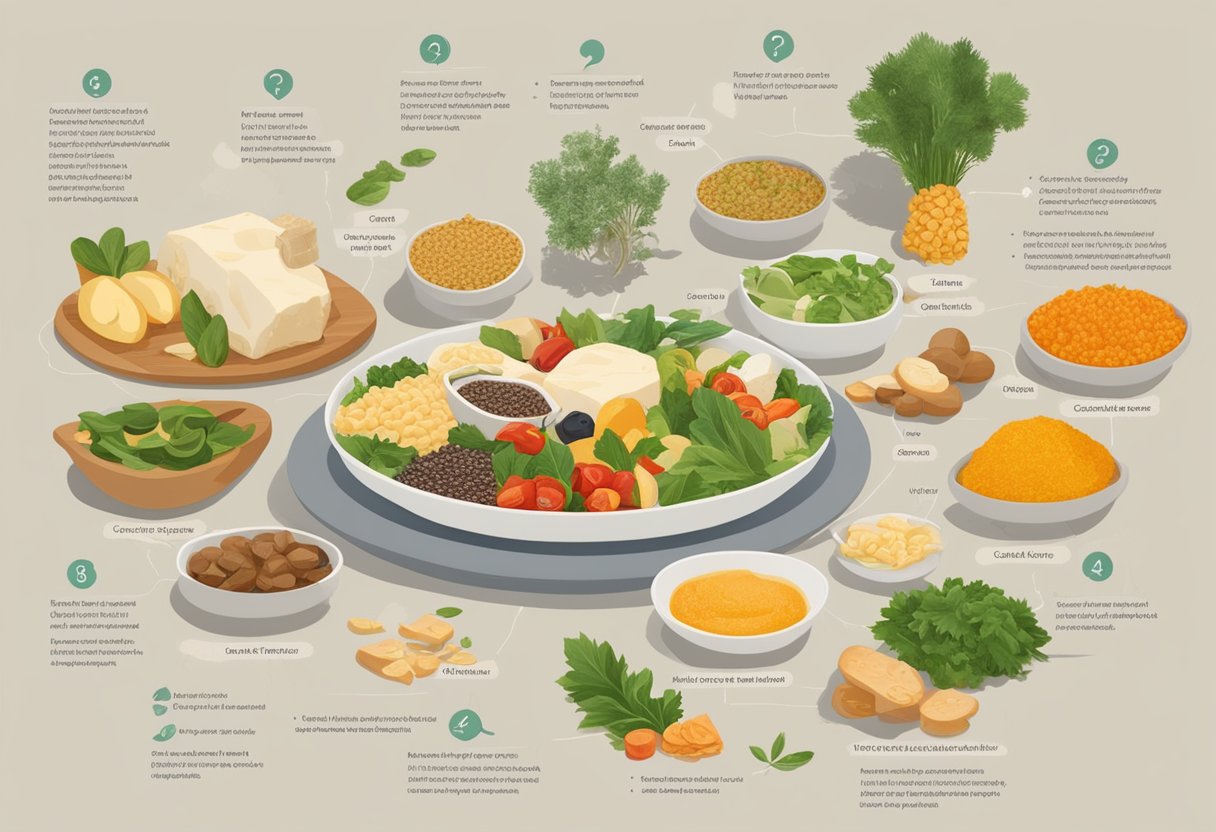Maintaining bone health is essential for a person’s overall well-being, especially as they age. The Mediterranean diet, known for its plentiful use of fruits, vegetables, whole grains, and healthy fats, also offers a variety of calcium-rich foods that are beneficial for bone strength. Incorporating these foods into one’s diet can help meet the daily recommended calcium intake without relying solely on supplements.

The Mediterranean diet not only delivers important nutrients for bone health but also supports a lifestyle that can help prevent osteoporosis. Key components of this diet, such as leafy greens, nuts, and legumes, are not only rich in calcium but also provide other nutrients that assist in its absorption, making them excellent choices for maintaining healthy bones. Understanding how these foods and dietary practices contribute to bone health is crucial for individuals at all stages of life.
Key Takeaways
- Bone health can be supported by the calcium-rich foods of the Mediterranean diet.
- The diet emphasizes foods that aid in calcium absorption, important for preventing bone-related illnesses.
- Adopting Mediterranean dietary practices can contribute to maintaining strong bones over a lifetime.
Table of Contents
Understanding Bone Health
Bone health is essential for maintaining a strong skeletal structure and preventing diseases such as osteoporosis. Calcium and Vitamin D play critical roles in supporting bone vitality, particularly as one ages. A balanced diet rich in these nutrients is key to preserving bone mineral density.
Role of Calcium and Vitamin D
Calcium is the cornerstone of strong bones. Bones store 99% of the body’s calcium, making it crucial for maintaining their structure and function. Vitamin D is equally important as it facilitates calcium absorption in the gut. Insufficient levels of Vitamin D can lead to conditions like rickets in children and bone softening in adults.
- Sources of Calcium: Dairy products, leafy greens, and calcium-fortified foods.
- Sources of Vitamin D: Sun exposure, fatty fish, and fortified foods.
Impact of Age on Bones
As individuals age, bones can lose density and strength, a natural process often accelerated by a lack of nutrient-rich diets. Sufficient calcium and Vitamin D levels are vital in maintaining bone tissue health over time. After reaching peak bone mass, a decline in density begins, which can pose risks for frail bones.
Preventing Osteoporosis
Osteoporosis is a condition characterized by weak bones that are prone to fractures. A diet rich in calcium and Vitamin D, like the Mediterranean diet, along with lifestyle choices such as regular exercise, can help prevent the onset of osteoporosis. It’s important to start these habits early to bolster bone strength throughout life.
Bone Mineral Density and Nutrition
Bone mineral density is a measure of the amount of minerals in the bones, serving as an indicator of overall bone health and fracture risk. Adequate nutrition, particularly adherence to a diet that provides essential nutrients, helps preserve bone density. The Mediterranean diet, rich in fruits, vegetables, nuts, and whole grains, can contribute to a nutrient-dense menu that supports bone health.
Components of the Mediterranean Diet
The Mediterranean Diet is renowned for its variety of nutrient-dense foods that promote bone health, including a balance of healthy fats, proteins, and a wealth of vitamins and minerals.
Key Foods and Nutrients
The core of the Mediterranean diet includes staples like whole grains, which provide essential fiber; various nuts that supply healthy fats and proteins; and a diverse selection of legumes, which are excellent sources of protein and fiber. Most of these foods are inherently gluten-free, making them suitable for individuals with gluten sensitivities.
Beneficial Fats in Olive Oil
Olive oil is a staple of the Mediterranean diet, rich in monounsaturated fats that are beneficial for heart and bone health. It also contains polyphenols, which are known for their antioxidant properties.
Proteins and Legumes
Proteins play a pivotal role in the maintenance of muscle and bone strength, and the Mediterranean diet provides them through a variety of legumes and fish. Chickpeas, lentils, and beans are gluten-free legume options that are staples in this diet.
Fruits and Vegetables Rich in Vitamins
An abundance of fruits and vegetables in the Mediterranean diet ensures a high intake of vitamins, including Vitamin C, and important phytochemicals such as lycopene. These not only contribute to overall health but are also key for maintaining strong bones.
Calcium-Rich Foods in the Diet
Maintaining strong bones requires calcium, a nutrient plentiful in the Mediterranean diet. This section explores the variety of foods within this diet that are rich sources of calcium.
Dairy Products and Alternatives
Dairy products provide a significant source of calcium. Traditional Mediterranean choices include yogurt, cheese, and milk. Consuming low-fat dairy products also aligns with the diet’s principles of moderation and heart health. For those who don’t consume dairy, almond milk, soy milk, and rice milk are often fortified with calcium, providing an alternative source of this essential mineral.
- Milk (1 cup): 300 mg
- Low-fat yogurt (6 oz.): 300 mg (Bone Health & Osteoporosis Foundation)
- Fortified almond milk (1 cup): Approximately 300 mg
Leafy Greens and Cruciferous Vegetables
Leafy greens and cruciferous vegetables are staple components of the Mediterranean diet. Vegetables such as kale, collard greens, broccoli, and bok choy offer calcium along with additional nutrients. These green vegetables are both nutritious and versatile, easily added to salads, stews, or enjoyed as side dishes.
- Kale (1 cup, cooked): 94 mg
- Collard greens (1 cup, cooked): 268 mg
Fortified Foods and Beverages
Fortification of foods and beverages increases the availability of calcium in the Mediterranean diet, especially for those adhering to a gluten-free lifestyle. Orange juice and cereals that are calcium-fortified can be excellent sources. Fish like sardines with their edible bones also contribute significant amounts of calcium.
- Calcium-fortified orange juice (1 cup): 349 mg (Cleveland Clinic)
- Calcium-fortified cereal (1 serving): Varies by brand
Lifestyle Factors Affecting Bone Health

A person’s bone health can be greatly influenced by their daily habits and choices. Certain lifestyle factors have a powerful impact on bone strength and the risk of fractures.
Physical Activity and Bone Strength
Regular physical activity, especially weight-bearing exercises such as walking and running, is essential for maintaining strong bones. Activities like swimming and cycling can also contribute, although they are not as effective at promoting bone density. For individuals following a Mediterranean diet, incorporating exercises alongside this diet can further enhance bone health.
Alcohol and Caffeine Consumption
Excessive alcohol consumption can lead to bone loss and increased risk of fractures. It is recommended to limit alcohol intake to moderate levels. Similarly, too much caffeine can interfere with the body’s ability to absorb calcium, which is a vital mineral for bone health. Individuals should be mindful of their consumption of caffeine-containing beverages.
Smoking and Bone Density
Smoking has a detrimental effect on bone density. This habit can decrease the amount of calcium absorbed by the bones, leading to weaker bones and a higher chance of fractures. Quitting smoking is an important step for anyone looking to improve their bone health.
Supplementation and Nutrient Absorption

When considering bone health, the absorption of nutrients from supplements is as critical as their intake. The Mediterranean diet, lauded for being rich in nutrients beneficial to bone health, can be complemented with select supplements to address any dietary gaps.
Vitamin and Mineral Supplements
Supplements often heralded for their bone health benefits include calcium, vitamin D, and magnesium. These are integral for maintaining bone density and preventing diseases like osteoporosis. Calcium is foundational for bone health, while Vitamin D greatly enhances its absorption and use in the body. Magnesium and Potassium aid in the retention of calcium and support overall skeletal strength. To complement a gluten-free Mediterranean diet, individuals may consider fortified foods—such as certain dairy alternatives and juices—that contain added essential nutrients.
| Nutrients | Benefits for Bone Health |
|---|---|
| Calcium | Builds and maintains bones |
| Vitamin D | Increases calcium absorption |
| Magnesium | Supports bone mineral composition |
| Potassium | Balances pH to prevent calcium loss |
Interactions with Food and Beverages
The effectiveness of nutrient supplements can be influenced by what else is consumed. For instance, tea and coffee can hinder iron absorption if consumed excessively, while they may also affect calcium absorption. Excessive salt intake can cause the body to expel calcium, which can be detrimental to bone health. Sugar and foods high in phosphorus can also decrease calcium retention. Conversely, a diet high in fiber can be beneficial but needs careful consideration as it can interfere with the absorption of minerals like calcium if not balanced correctly. Oxalates found in certain plants can bind with calcium and lessen its absorption, while Vitamin K boosts bone density by aiding calcium incorporation into the skeleton. It’s essential for individuals to be mindful of these interactions to maximize their benefit from supplements.
Understanding Food Labels and Dietary Recommendations
When trying to maintain bone health, understanding food labels and dietary recommendations is crucial. They provide guidance on how to choose foods rich in calcium and vitamin D, which are vital for bone health.
Deciphering the Daily Value
The term Daily Value (DV) on food labels indicates how much of a nutrient is in a single serving of food, in terms of a percentage. For instance, if the DV of calcium in a yogurt serving is 20%, that serving provides 20% of the calcium one should consume daily. It’s important to note that these percentages are based on a diet of 2,000 calories per day, which might not fit everyone’s dietary needs.
Recommended Dietary Allowances
Recommended Dietary Allowance (RDA) for nutrients like calcium are set by health experts to meet the needs of most healthy people. For example, adolescents require about 1,300 milligrams of calcium per day, while adults up to age 50 need approximately 1,000 milligrams. After the age of 50, the RDA increases due to higher requirements for bone health maintenance. Vitamin D levels are also considered, with RDAs provided to ensure adequate absorption of calcium.
Consulting Healthcare Professionals
Individuals should consult healthcare professionals, such as a registered dietitian, for tailored nutrition advice. These experts can provide specific guidance on adhering to a healthful diet that supports bone health, considering a person’s unique dietary requirements, like those following a gluten-free Mediterranean diet. They can answer questions about food labels, RDAs, and how to adjust one’s diet to ensure proper intake of calcium and vitamin D.
Special Considerations for Various Life Stages

The Mediterranean diet, when tailored for specific life stages, can greatly impact bone health. This diet, known for its abundance of calcium-rich foods, is crucial for maintaining bone density and overall skeletal strength during key periods of growth and hormonal change.
Calcium Needs During Menopause
During menopause, a woman’s body undergoes significant changes, often leading to decreased estrogen levels. This decrease can result in a loss of bone mineral density, increasing the risk of osteoporosis. Therefore, it’s vital for menopausal women to consume adequate calcium, which can be found in leafy greens, dairy alternatives, and fish like sardines and salmon commonly consumed in a Mediterranean diet.
Bone Health in Childhood and Adolescence
Childhood and adolescence are critical periods for bone development. Insufficient calcium intake at this stage can lead to rickets or delayed skeletal growth. Adolescents should consume a diet rich in calcium and vitamin D to support bone health and avoid vitamin D deficiency. The Mediterranean diet offers varied sources of these nutrients through dairy products, fortified foods, and vegetables like kale and broccoli.
Creating a Balanced Mediterranean Meal Plan
Crafting a Mediterranean meal plan that supports bone health involves incorporating a variety of calcium-rich foods and optimizing nutrient intake for a well-rounded diet.
Incorporating a Variety of Calcium Sources
A Mediterranean diet is abundant in foods that are naturally rich in calcium. Key calcium contributors include dairy products like yogurt and cheese, which can be enjoyed daily in moderation. For those following a gluten-free Mediterranean diet, focus on naturally gluten-free calcium sources such as leafy green vegetables, which include:
- Kale
- Collard greens
- Spinach
In addition to greens, other calcium-rich foods to integrate into meals are:
- Almonds
- Canned sardines
- Fortified gluten-free cereals
It’s important to consider variety not just for nutritional benefits but also to keep meals interesting and flavorful.
Strategies for Optimizing Nutrient Intake
To maximize the benefits of a Mediterranean diet, it’s critical to balance the diet with a mixture of proteins, fats, and other nutrients. Legumes such as lentils and chickpeas offer both protein and calcium, supporting bone health without gluten. Fruits and vegetables should be the cornerstone of every meal, providing not only calcium but also a symphony of essential nutrients and fibers. Here’s a brief guide to optimizing nutrient intake:
- Protein sources: Include fish, poultry, beans, and eggs regularly.
- Healthy fats: Use olive oil as the main added fat.
- Whole grains: Choose gluten-free options like quinoa and brown rice.
- Nuts and seeds: A daily handful of nuts, like almonds or chia seeds, contributes good fats, calcium, and protein.
By following these strategies, individuals can enjoy a balanced, calcium-rich Mediterranean diet that promotes bone health while adhering to gluten-free dietary needs.
Impact of Cooking and Processing on Nutrients
Understanding how cooking and processing affect the nutrient content of foods is key to maintaining their nutritional benefits and supporting bone health.
Effects on Calcium and Vitamin Content
Calcium is a crucial mineral for bone health and is abundant in dairy products, leafy green vegetables, and fortified foods. The cooking process can influence the calcium content in foods. For example, boiling vegetables can cause calcium, which is water-soluble, to leach into the cooking water. Conversely, vitamin D is not significantly affected by cooking, but exposure to sunlight can degrade it in fortified foods.
Vitamin C, another essential nutrient, is sensitive to heat and can also be lost during the cooking process. As vitamin C is important for the absorption of calcium, the way foods are prepared and cooked can have indirect effects on bone health, potentially influencing the risk of osteoporosis.
In contrast, minerals like magnesium and potassium, which also play a role in bone strength, are more stable during cooking, although high-heat and extended cooking times might still reduce their presence.
Best Practices for Preserving Nutrients
To preserve vitamins and minerals when cooking:
- Use minimal water: Steam or microwave vegetables instead of boiling to minimize the loss of calcium and vitamin C into the cooking water.
- Short cooking times: Cook vegetables until they’re just tender to retain more nutrients.
- Preserve cooking liquids: When boiling or poaching, consider keeping the liquid for use in soups or stews to salvage vitamins and minerals that may have leached out.
For processed foods, those that are fortified with nutrients can offer additional calcium and vitamin D, while maintaining a diet rich in natural sources of these nutrients found in the Mediterranean diet, including fruits, vegetables, and olive oil, ensures a balanced intake of all essential dietary components.
Processing can affect the nutritional quality of foods; canning, for example, often adds sodium, which should be moderated in a healthy diet. On the contrary, fermentation, as in the case of yogurt, can enhance the bioavailability of calcium and other nutrients. Select fortified foods wisely to avoid excess intake of certain nutrients and opt for whole foods in their natural state as much as possible.
Conclusions
The Mediterranean diet, rich in calcium and other key nutrients, supports bone health effectively. This diet includes a variety of calcium-rich foods like dairy products, leafy greens, and nuts. For those on a gluten-free regimen, the Mediterranean diet offers many suitable options that contribute to bone strength.
Calcium in the diet:
Calcium is vital for maintaining strong bones. The Mediterranean diet provides this through:
- Dairy: milk, cheese, and yogurt
- Vegetables: kale, broccoli, and spinach
- Nuts: almonds and hazelnuts
Adequate calcium intake from these foods helps prevent osteoporosis, a condition where bones become weak and fragile.
Gluten-free choices:
Many Mediterranean foods are naturally gluten-free, making this diet accessible for those with celiac disease or gluten sensitivity. Such options include:
- Fruits: oranges and figs
- Protein: fish and poultry
- Fats: olive oil
These foods contribute not just to bone health but also to overall well-being.
In conclusion, adopting a Mediterranean diet can be a positive step toward enhancing bone strength and overall health, including for individuals following a gluten-free diet.
Frequently Asked Questions

In this section, we address common inquiries about the role of the Mediterranean diet in promoting bone health and its specific benefits regarding calcium intake.
How can following a Mediterranean diet contribute to bone health and prevent osteoporosis?
Adhering to a Mediterranean diet has been linked to improved bone health, as it emphasizes the consumption of fruits, vegetables, whole grains, and healthy fats known to support bone density.
What specific foods within the Mediterranean diet are rich in calcium?
Certain foods prevalent in the Mediterranean diet provide high levels of calcium; these include leafy greens, such as kale and spinach, as well as dairy products like yogurt and cheese.
Which Mediterranean diet recipes are particularly beneficial for maintaining strong bones?
Recipes that incorporate dairy, fish, legumes, and nuts are especially advantageous for bone strength, combining both calcium and other nutrients essential for bone maintenance.
Can you provide a sample Mediterranean diet meal plan that focuses on bone health?
Certainly, a meal plan that enhances bone health might include yogurt with almonds for breakfast, a kale salad with chickpeas at lunch, grilled sardines for dinner, and figs as a snack.
What are the benefits of the Mediterranean diet compared to other diets in terms of bone density and calcium absorption?
Compared to other diets, the Mediterranean diet naturally includes a diverse array of foods that are both rich in calcium and other key nutrients that aid in calcium absorption, like vitamin D.
How does the Mediterranean diet address the calcium needs for different age groups concerned with bone health?
The Mediterranean diet’s inclusion of a broad spectrum of foods that are high in calcium caters to the varying calcium demands of different life stages, thus promoting lifelong bone health.



